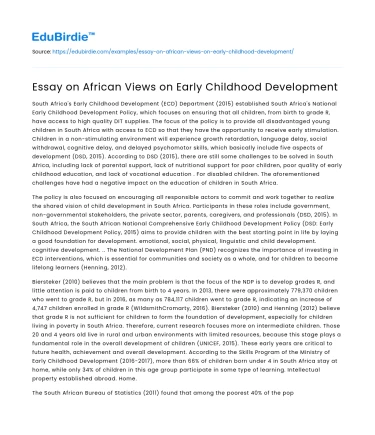South Africa's Early Childhood Development (ECD) Department (2015) established South Africa's National Early Childhood Development Policy, which focuses on ensuring that all children, from birth to grade R, have access to high quality DIT supplies. The focus of the policy is to provide all disadvantaged young children in South Africa with access to ECD so that they have the opportunity to receive early stimulation. Children in a non-stimulating environment will experience growth retardation, language delay, social withdrawal, cognitive delay, and delayed psychomotor skills, which basically include five aspects of development (DSD, 2015). According to DSD (2015), there are still some challenges to be solved in South Africa, including lack of parental support, lack of nutritional support for poor children, poor quality of early childhood education, and lack of vocational education . For disabled children. The aforementioned challenges have had a negative impact on the education of children in South Africa.
The policy is also focused on encouraging all responsible actors to commit and work together to realize the shared vision of child development in South Africa. Participants in these roles include government, non-governmental stakeholders, the private sector, parents, caregivers, and professionals (DSD, 2015). In South Africa, the South African National Comprehensive Early Childhood Development Policy (DSD: Early Childhood Development Policy, 2015) aims to provide children with the best starting point in life by laying a good foundation for development. emotional, social, physical, linguistic and child development. cognitive development. .. The National Development Plan (PND) recognizes the importance of investing in ECD interventions, which is essential for communities and society as a whole, and for children to become lifelong learners (Henning, 2012).
Save your time!
We can take care of your essay
- Proper editing and formatting
- Free revision, title page, and bibliography
- Flexible prices and money-back guarantee
Biersteker (2010) believes that the main problem is that the focus of the NDP is to develop grades R, and little attention is paid to children from birth to 4 years. In 2013, there were approximately 779,370 children who went to grade R, but in 2016, as many as 784,117 children went to grade R, indicating an increase of 4,747 children enrolled in grade R (WildsmithCromarty, 2016). Biersteker (2010) and Henning (2012) believe that grade R is not sufficient for children to form the foundation of development, especially for children living in poverty in South Africa. Therefore, current research focuses more on intermediate children. Those 20 and 4 years old live in rural and urban environments with limited resources, because this stage plays a fundamental role in the overall development of children (UNICEF, 2015). These early years are critical to future health, achievement and overall development. According to the Skills Program of the Ministry of Early Childhood Development (2016-2017), more than 66% of children born under 4 in South Africa stay at home, while only 34% of children in this age group participate in some type of learning. Intellectual property established abroad. Home.
The South African Bureau of Statistics (2011) found that among the poorest 40% of the population, 80% of children in this age group do not have access to a registered early childhood development plan. This shows that children living in poverty are more likely to be unable to obtain high-quality early childhood development facilities. In 2014, 37,000 early learning centers served 65% of the poorest children and families, of which only 19,000 were registered with DSD.






 Stuck on your essay?
Stuck on your essay?

